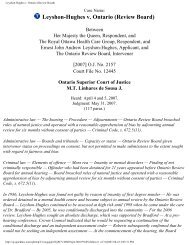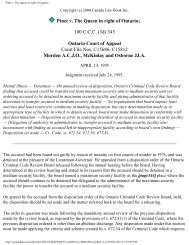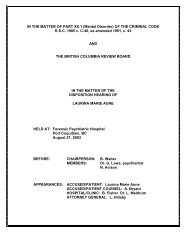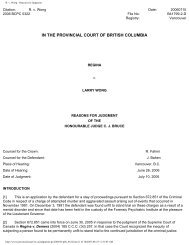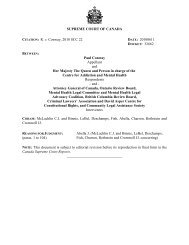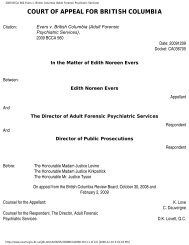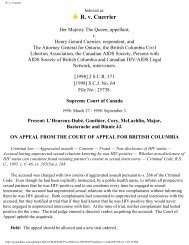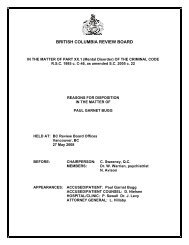LaFortune [LaFortunate] (Re) - British Columbia Review Board
LaFortune [LaFortunate] (Re) - British Columbia Review Board
LaFortune [LaFortunate] (Re) - British Columbia Review Board
Create successful ePaper yourself
Turn your PDF publications into a flip-book with our unique Google optimized e-Paper software.
<strong>LaFortune</strong> [<strong>LaFortunate</strong>] (<strong>Re</strong>)In order to ensure that the process of determining guilt is as accurate as possible, thatthe accused can participate in the proceedings or assist counsel in his/her defence, thatthe dignity of the trial process is maintained, and that, if necessary, the determination ofa fit sentence is made possible, the accused must have sufficient mental fitness toparticipate in the proceedings in a meaningful way. At the same time, one mustconsider that principles of fundamental justice require that a trial come to a finaldetermination without undue delay. The adoption of too high a threshold for fitness willresult in an increased number of cases in which the accused will be found unfit to standtrial even though the accused is capable of understanding the process and anxious for itto come to completion. 46 The "limited cognitive capacity" test as set out in R. v. Taylor was specifically approved by theSupreme Court of Canada in R. v. Whittle (1994), 32 C.R. (4th) 1, at pp.15-16. 47 In light of the above, is Ms. <strong>LaFortune</strong> unable, on account of mental disorder, to understand thenature, object and potential consequences of a criminal trial? The <strong>Re</strong>view <strong>Board</strong> found that she coldidentify the principal actors at the court: the judge (the man in a different suit), her lawyer, and anotherwoman (at the court fitness hearing, the Crown Counsel was a woman). She was not quite so clear as totheir respective functions, but she did know that the judge "runs the show" and her lawyer talked aboutthings. She also knew the principal risks a trial might have for her -- jail (which she at first referred tosimply as "that place") or probation, and as far as the latter was concerned her replies to her owncounsel's questions revealed a reasonable knowledge of what was involved in reporting to a probationofficer. She also appeared to associate being sent to the Forensic Psychiatric Institute (which shereferred to as "dummy Forensic") as a consequence of court proceedings, although she was adamant thatshe would not be sent there this time. While some of her answers to her counsel were of the "I don'tknow" variety, generally these answers related to questions asking for the meaning of legal terms, suchas "trial", "I represent you" and "undertaking". Ms. Rupert-Bailey did not attempt to simplify thequestions by using less technical terms, such as "promise", which her client did understand. It is perhapsnot surprising that Ms. <strong>LaFortune</strong> does not know the meaning of these words inasmuch as she has notattended the regular school system, does not read much, and apparently has never been at an actual trialor had the nature of the trial process explained to her. The <strong>Re</strong>view <strong>Board</strong> is satisfied that Ms. <strong>LaFortune</strong>meets the "limited cognitive capacity" test in that she has a general idea of the nature and object of theproceedings, and of the consequences of being found guilty. Moreover, in the light of her IQ of 72 andher responses to Dr. Laws' questions, the <strong>Re</strong>view <strong>Board</strong> is of the opinion that, Ms. <strong>LaFortune</strong> has thecapacity to increase her understanding of these matters if properly coached. 48 The second inquiry that must be made is about the capacity of accused to communicate with hercounsel as required by paragraph (c) of the definition of "unfitness to stand trial". Ms. Rupert-Bailey toldthe hearing that she found questioning her client to be a very frustrating experience, and Ms. Gildinggave evidence that Ms. <strong>LaFortune</strong> sometimes would not speak to her lawyer. Once again, we mustremind ourselves that the issue is not how satisfied counsel is with the degree of communication that hasexisted heretofore with her client, but whether her client is "unable on account of mental disorder tocommunicate with counsel."http://ql.quicklaw.com/qltemp/C2KEwCMAFbZMTYcs/00049bcrb-00000604%2ehtm (13 of 16)2007-08-21 1:59:51 PM


![LaFortune [LaFortunate] (Re) - British Columbia Review Board](https://img.yumpu.com/42779845/13/500x640/lafortune-lafortunate-re-british-columbia-review-board.jpg)
